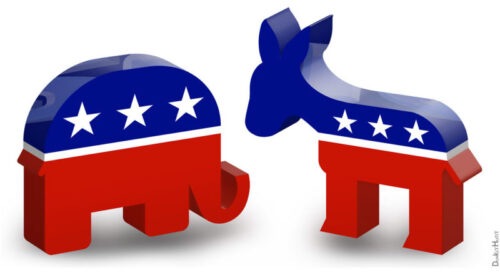A question that is frequently asked of local candidates running for non-partisan seats for mayor and city commission is, “What political party do you belong to?”.
Party designation is not required for commission/mayor candidates and there will be no ‘D’ or ‘R’ by their names on the upcoming November ballot. Nevertheless, many voters consider party affiliation and history as a factor in their decision even when voting for non-partisan offices.
The following is a rundown of on-record political party affiliation for the Great Falls city commission candidates. Our previous installment took a look at Great Falls mayoral candidates.
All campaign finance reports can be found here.
Kendall Cox
Past political party experience: Unknown.
Party associated campaign donors: Unknown. Has not filed required C1 or any Campaign Finance Reports with the Montana Office of Political Practices.
Eric Hinebauch
Past political party experience: GOP precinct Committeeman, precinct 26A.
Party associated campaign donors:
- George Nikolakakos, GOP state representative.
Micaela Stroop
Past political party experience: Unknown.
Party associated campaign donors: Unknown. Has not filed required C1 or any Campaign Finance Reports with the Montana Office of Political Practices.
Rick Tryon
Past political party experience: Ran unsuccessfully as a Republican for state legislature twice in general elections and once in primary election, also ran unsuccessfully in GOP primary for Cascade County Commission. Former Vice Chair for Cascade County Republican Central Committee.
Party associated campaign donors: None.
Shannon Wilson
Past political party experience: Founding Member #6 of Big Sky 55+, a liberal Democrat candidate and issue advocacy group. Secretary, Board Member for Great Falls Rising, a local ‘progressive’ group.
Party associated campaign donors:
- Don Ryan, former Democrat state representative and senator, former Democrat appointee to Cascade County Commission.



Eric Hinebauch has stated publicly that he supports marijuana. He has privately stated that he favors the marijuana industry because it is good for the economy. He does not seem to understand the tremendous local public expenses that supports the psychological and physical therapy required by moderate to heavy marijuana users to protect their legally required health, safety, and welfare [HSW] (numerous state laws).
State law MCA 50-32-201(1-8) defines eight criteria for designating a chemical to be called a dangerous drug. Marijuana meets all eight of that laws requirements as a dangerous drug in several ways over time, frequent use, and THC potency above 1%. Eric’s response was that he would change that law. He expressed no concerns about the HSW of the people.
I find him a dangerous candidate.